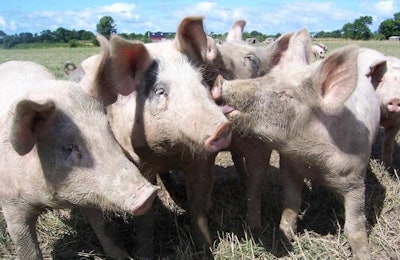
While the central European state of Slovakia has confirmed its first ever cases of African swine fever (ASF), there have been reports of confirmed new outbreaks among domestic pigs in Bulgaria, Moldova, Poland, Romania and Ukraine.
Slovakia’s agriculture ministry has reported its first ever outbreak of African swine fever (ASF) to the World Organisation for Animal Health (OIE) in the past week. The ASF virus was detected in a backyard group of four pigs after one animal showed signs of the disease on July 23. Although the source of the infection is unknown, the affected premises is in Kosice, which shares a border with regions of Hungary where the disease has been detected among wild boar.
ASF has returned to two central regions of Ukraine after an absence of just a few weeks. OIE has been informed by the national veterinary agency that the disease has been confirmed at a farm with 222 pigs in the central oblast of Kirovohrad, and in a single backyard animal in Ternopil.
After a longer absence of more than four months, ASF has again been detected in domestic pigs in Moldova. Latest to be affected was a herd of 10 animals — one of which died — in Cahul, a district in the south of the country that borders Romania.
Poland’s total number of ASF outbreaks on farms so far this year has risen to almost 16,400 pigs at 25 locations. Occurring between July 12 and 21, the eight latest outbreaks involved the loss of 4,070 pigs through mortality or destruction — of herds ranging in size from 8 to 3,347 animals. Five of the premises were in Lublin, two in Masovia, and one in Warmia-Masuria — all in the east of the country where there have been ASF outbreaks in the wild boar population.
After a first ASF outbreak in Russia’s Volgograd oblast in early July, UrduPoint News reported that, to halt the spread of infection, a 5-kilometer quarantine was immediately set up around the town of Petropavlovka, which only has two households keeping pigs.
Bulgaria, Romania call for support to step up ASF controls
Members of the European Parliament for Bulgaria and Romania have called for EUR70 million (US$78 million) in financial support from the European Union to support their countries’ efforts to control ASF, reports news agency Novinite.
In response, European Union (EU) Health and Food Safety Commissioner Vytenis Andriukaitis said culling infected animals is the only way to control the disease, and that the EU is compensating up to 75% of the costs of disinfectants, cleaning of premises, and burial of infected pigs, reported Radio Bulgaria.
Bulgaria is reported to be stepping up its actions to control the spread of the disease, which appears to be spreading to domestic pigs in new regions.
While no new outbreaks of ASF have been officially recorded by Bulgaria’s animal health authority to the OIE over the past week, local media have reported outbreaks at three new locations in Bulgaria, which they say threaten the future of the country’s pig industry.
After the culling of 14,000 animals this month, the authorities are in the process of depopulating 40,000 pigs at a farm near the city of Ruse, and will have to do the same to 30,000 more animals at another commercial premises in the north of the country, reported Mercopress at the end of last week. These bring to 20 the number of ASF outbreaks among backyard herds and commercial pig farms in Bulgaria.
Since ASF was first detected in Romania around one year ago, most of the cases have been in very small backyard herds of domestic pigs.
However, the animal health agency has informed the OIE over the past week of an outbreak at a large farm in the county of Ilfov, which surrounds the capital city, Bucharest. Seven of the 19,750 pigs at the farm died, and the destruction of the rest of the herd was ongoing at the time of reporting. In addition, there were 88 new outbreaks among backyard herds in the north and south of Romania, making losses to the disease over the past week alone to more than 20,000 pigs.
Up to July 22, there have been 495 confirmed outbreaks of ASF among domestic pigs in Europe this year, according to the European Commission (EC). By far worst affected has been Romania (421 outbreaks), followed by Ukraine (24), Poland (21), Bulgaria (16) and Lithuania (11).
ASF in European wild boar: Disease returns to northern Ukraine
After a six-month absence, ASF has been detected again in wild boar in the central Ukrainian oblast of Ternopil. Three animals tested positive for the virus at one location during the third week of July.
Over the past week, Romania’s veterinary agency has reported to the OIE a further 10 ASF outbreaks in its northern and southern districts, involving 23 wild boar.
Other countries in central and eastern Europe with new outbreaks were Latvia (7), Russia (4) and Belgium (2). One of the Russian outbreaks — in Ulyanovsk in the Volga Federal District — is the location of previous cases in domestic pigs, but this is the first time this year that ASF has been detected in the oblasts Novgorod (Northwestern Federal District) and Tver (Central Federal District).
In Belgium, 825 of the 3,413 wild boar tested to July 16 were have been positive for the ASF virus, according to the official website of the French-speaking region of Belgium, Wallonia. As a result of the continuation in new cases among wild boar, access to forest areas of Luxembourg province has been subject to additional restrictions since July 1.
So far this year, there have been 3,554 confirmed outbreaks of ASF among European wild boar, according to the EC. Poland reported the most outbreaks (1,392), followed by Hungary (755), Belgium (478), Romania (320), Lithuania (317) and Latvia (187).
View our continuing coverage of the African swine fever outbreak.

















